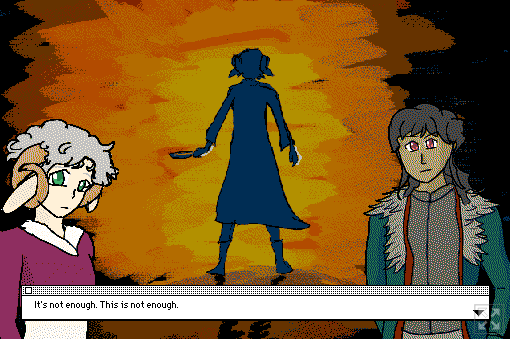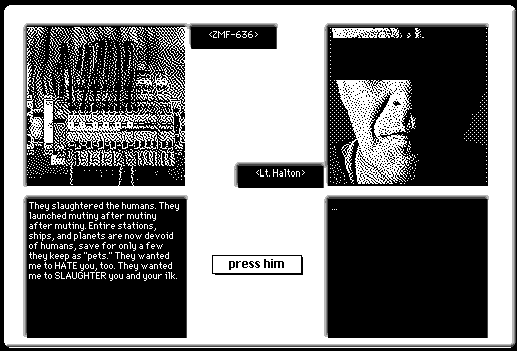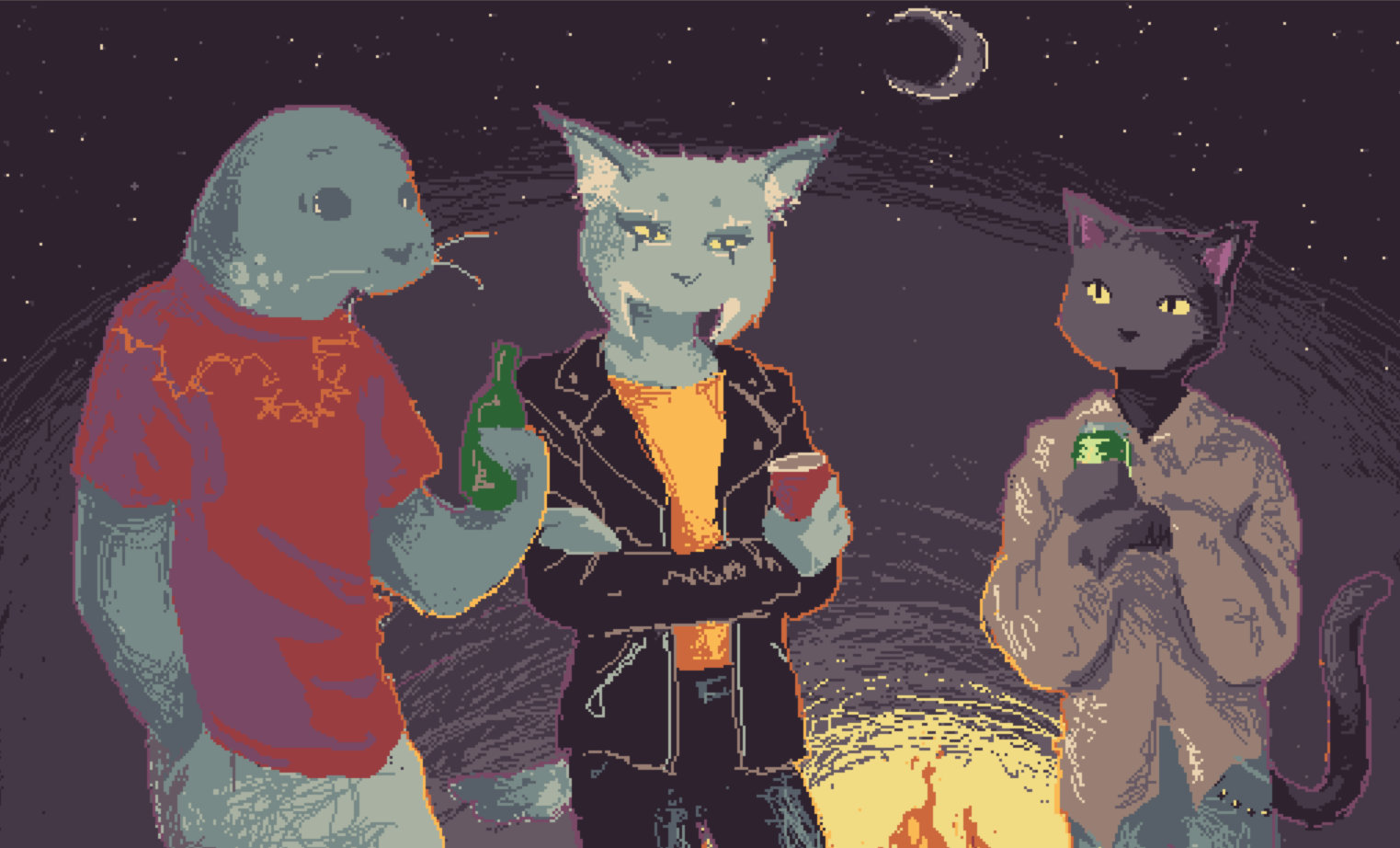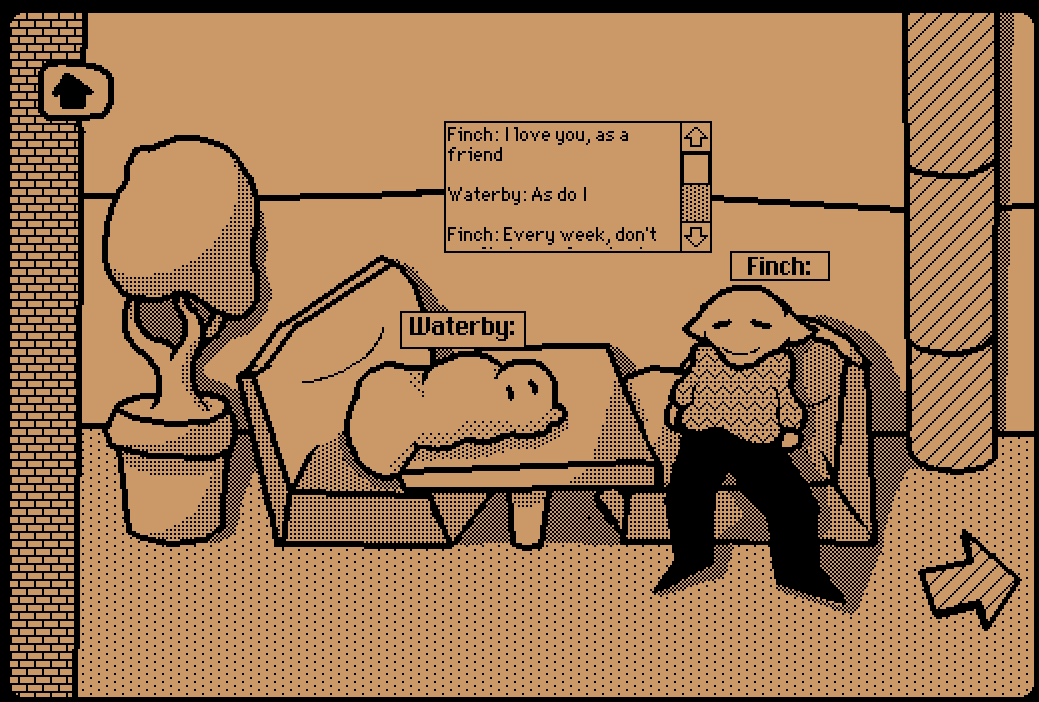Cao Pi and the Decker Visual Novel Jam - A Discourse on Slaughter
This post is a retrospective on participating in Decker Visual Novel Jam, the process of making my submission as well as my thoughts on some of the others. I'm also going to be talking about Discourse on Literature by Cao Pi which I read this week and motivated this reflection.
1. A Discourse on Literature
Cao Pi (That's Emperor Wen, courtesy name Zihuan) is probably most famous for his political role in the Three Kingdoms period of China where he became the first emperor of Cao Wei following the "abdication" of some guy who only became emperor because his brother cried a lot. He was also a poet and a writer and much of his works survive to this day.
Politically he lived in the shadow of his father (some guy who betrayed the world) and as an artist he lived in the shadow of his much more famous brother, Cao Zhi. I think that he was probably insecure about this. For one it would just make sense to be a little insecure but also I recently read what might be his most famous piece of writing 论文 the Discourse on Literature, and yeah, I think he was pretty insecure.
This essay has survived the ravages of time because in the 500s some guy called Xiao Tong collected it in Wen Xuan, a very famous literary anthology. The work is apparently historically interesting because of its popularisation of qi as relevant to literary analysis but I also read that nobody gives a fuck about that historical titbit. That's a cool little fact but it's not enough to make a piece of literature as enduringly interesting as this one.
No, people keep reading this not because of some historical significance but because of it's own merits as melancholy and insecure piece that thinks about the nature of talent and the value of art. When I read it that was what I was thinking about.
In the first section of the essay he talks about those who he admires. He talks about the strengths and weaknesses of his contemporary poets, he talks about how each of them in their desire to be known, to be seen and understood, perhaps to communicate something, have been overcome with jealously and competitiveness in comparing themselves to others. This is the reason he gives for writing this discourse on literature: he, declaring himself 君子, is going to address this issue.
He starts off trying to do this, trying to offer up some kind of analysis of the strengths and weaknesses of the great writers of his time but he keeps coming back to this idea of self knowledge, that art somehow reflects on a truth held within someone. And in this he comes to make a grand statement: that one's qi is the most important element of one's writing. He further states that it can not be changed, that no matter how hard someone works they can not overcome that barrier, that qi can not be transferred from father to son or between two brothers. Knowing what we know about him it is fun that he chose those two things as examples: I'm sure he wished that he could have something of his father's political cunning or his brothers literary talent.
Here begins what I read as a great melancholy. It began with a lamenting of those who can not know themselves, of the uselessness of hard work and then he tell us why it is sad that people can not reach this greatness that he aspires to: death is an end. Mortality will bring an end to all status and pleasures and the only way to transcend this, the only way that we can make ourselves known throughout eternity, is to write things which can communicate ourselves so that they can be read. In the creation of art an immortality can be reached but only if one is a great writer. Therefore skill at writing carries not just the weight of recognition in the world but the possibility of eternity or the oblivion of being unknown.
People go about their lives and busy themselves with petty concerns when only by dedicating oneself to literature can one ever do anything that lasts. Earlier he said that no hard work can change this outcome but here as he hurtles towards the end of his essay he returns to the idea and concludes that one must engage in hard work to create literature, the only thing that is really worthwhile. His old friends whose works he had critiqued earlier are dead and he laments that they did not do enough, that their work has not granted them immortality.
It's a great ending. It is sad and conflicted and so very revealing and raw and yeah, I see why people like this. I see why the reason this is remembered isn't for any historical trivia but because it is melancholy and poignant and really relatable.
It's not quite the content that I find relatable: I have no aspirations for immortality, the finiteness of my exitance and my works gives me comfort. Rather it's all these inconsistences and little lies about what art means to oneself. There's a reason that I think reading this essay this week has really spoken to me and it's because I've been thinking about those things too.
I also wrote something recently that had a point to make about the nature of art transcending mortality through communicating understanding and it is just as inconsistent. That's what I'll be talking about in the next section.
2. To Witness a Slaughter
When I decided to make something for the Decker Visual Novel Jam it was because I was stuck in a bit of a rut with some of my other projects. My normal writing group had been on hiatus since February and so I wasn't really getting to share my writing as much. Sharing my writing with other creative people is important to me, it is what keeps my creativity going. I really appreciate the social aspects of art.
So I wanted to make something that people could read. Something that was complete and something that wouldn't be trapped in perfectionist purgatory. The point of this story was always primarily to be read which if you've read it you maybe think runs counter to its narrator's stated position on art. I want to analyse this inconsistency and the broader inconsistences in Ignacie's thinking because I think they reflect conflicts in my own mind as I was writing.
First I want to talk about how I wrote To The Slaughter, about the process itself. I challenged myself to complete my entry in just one week. There were a few reasons for this and perhaps the most important was that I was pretty sure I wouldn't have the time to spare for a whole month. It's exam season at my uni at the moment which means a lot of marking and helping students and that sort of thing. A limited time frame would also mean I wouldn't have time for my perfectionist instincts to take hold: It would be done and it would be out there.
I talked about that week on a forum that I was posting on, about how I dedicated every free moment I and to writing or drawing or searching for pictures. Even when I wasn't doing any of these things I was thinking about it. My whole life was this project for that week. In that post I talked about the thrill I got out of that kind of single mindedness, I compared it to performance in music or theatre. Another posted compared it to crunch. I'm not in the games industry so I can't talk much on what that is like but it did make me stop and think, because yes, in the aftermath I felt completely exhausted, I needed time to recover. I think that if I were ever doing something like this in collaboration with someone then I'd have to be very conscious of this.
The reason that I mention the intensity of that week is because it affected how I was writing. I gave myself three days to write the script for The Slaughter. I came in with pretty much no prep. I had a basic idea but none of the characters were really fleshed out. In a lot of ways it was like improv with me sitting in the library with my notebook and as an idea came to me I wrote it down. Lots of the ideas and themes thus emerged through the action of writing as opposed to having been consciously planned. I think because of this, because of how the text manifested almost like a stream of consciousness, it feels quite revealing and raw and maybe if you don't know me that well it won't be obvious but I put a lot of myself into that text.
I had no idea what to do with Orrin. I'd written a name and a couple of words of description but while I had a vision for characters like Flavia and Llewella, for Orrin I had no idea what his deal was. At some point I though that he might be interesting as an artistic character. I wanted him to see through Ignacie somewhat and maybe it was in the truth of art that he was able to do that. This idea didn't really manifest and we ended up with something I really enjoyed.
Orrin tells us that he needs his art to be experienced by other people or he considers it meaningless to the point of not being art at all. Ignacie refutes this to him first, and then as a narrator she refutes it to us the audience: She tells us that it wouldn't matter, that she'd be happy just to have created something and that being seen isn't important.
When someone says "unreliable narrator" I do not get good vibes from that phrase. It makes me think of film bros and the phrase "It has an unreliable narrator" feels like it is always preceded by "you just don't get it." I feel Ignaice is unreliable though, does she cry for Orrin? She tells you no but idk I think maybe she did a bit. In the choice of a having a single narrator, as opposed to an omniscient third person, surely there is always an element of unreliability? We are getting one character's perspective on events, filled with their own biases and inconsistencies.
Because it absolutely does matter to Ignacie. She needs to be seen. She claims it isn't important, she claims she would be content, but as we plainly see in her confrontation with Llewella, it is not enough.

I would daydream about like how cool it would be to see my story go viral, have a film adaptation or something. I think that's a normal thing for writers to daydream about. I always called myself out on that daydream though. I assumed very few people would ever read this so I had to temper even my daydreams. I had to tell myself that it would be enough for me even if nobody ever witnessed my work. That's where those lines came from. That's why Ignacie tells herself it would be enough. Really it we me telling myself it would be enough.
And of course it wouldn't have been.
Just like Ignacie was lying to herself so was I. I already told you at the start of this section that I wanted to write something that could be read. I needed to be seen and somehow that need also made it into the story.
In the end people did read it. I've had over a dozen people tell me they enjoyed it. I've had people tell me how they found it emotionally affecting, that I had "absolutely nailed it," that it was "fucking sublime," and that all felt amazing. I made a little collage of all the nice things people said to go in my diary: Something I can look at on days where I feel like a hack. It was an amazing few days.
Of course I wanted to push it further. I wanted to tell people to share it with their friends. I wished I had a greater social media presence so more people would play it and I could keep felling like this and there would be more and more and more. But too much would never be enough. That hole never ends, it can not be filled. That is the contradiction, the insecurity. I need to be seen. I will do anything to be seen and I need to keep telling myself that I won't be seen, I need to keep tempering that desire. It's not exactly the same as what Cao Pi was dealing with but I imagine just as I felt like I understood his conflict he would feel like he understands mine.
It is an unfortunate quirk that itch orders jam entries by popularity. It means that at the moment I can go to that page and see my game at the bottom. It makes sense, it was released a couple of weeks back so it's initial spike of plays will have passed now. It's longer than a lot of the other entries so it requires a bit more of a buy in. There are some scary content warnings. I don't really use itch for my writing so I don't have much of a preestablished audience here.
See how I'm making excuses? It shouldn't matter, I already told you how much people responded to what I made. Still, it never is enough, is it?
And of course I can't begrudge the entries above mine! There are some amazing things that came out of this jam and I want to talk about some of my favourites.
3. Things I liked!
3.1 Too Much
I feel like I have to talk about this one, not just because I really enjoyed it but also because it exists in a very similar space to my own game from a narrative perspective. In Too Much the humans belittle and abuse their robot servants, one of whom is our point of view character, and eventually this leads to a confrontation. It also includes the word SLAUGHTER in block capitals, which I approve of. I also like that word.

Unlike Ignacie, ZMF-636 is not all that murderous. ZMF-636 is deeply caring, they are sad and troubled by what they have seen and it is those emotions that I think make this an really interesting take on the now classic story of an AI turning on its humans.
I really like the look of this one too. I love the black and white and borders on the image that give things an almost physical feel. The writing is sometimes great. I really like the confrontation scene.
Given that this treads on some similar themes to my own game I have to say that if you are reading this and enjoyed To The Slaughter you must go and check this one out as well!
Too Much - KSG Extra Small Bytes #1
3.2 Drito Detectives: Picnic Investigators
This game also has someone who is mistaken for a goat-person (I promise this is the last time I mention my own entry).

So this one is a collaboration between a bunch of artists, which is really cool because we get a wide cast of wonderful characters and we get some different art styles on the end slides and there is just so much to love here. Visually this one is amazing, the character sprites are beautiful, the text box is also this wonderful custom frame that I love.
We get introduced to all these characters in an investigation for the missing Dritos. It is very cute and I adore all of them. Holly is my favourite <3 Once Aster and Phinxel are done investigating you then get to accuse a suspect of the crime!
Drito Detectives: Picnic Investigators
3.3 Pickles are Queer Food
This one looks so amazing. I really love the artwork, the great characters lit by the light of the fire and the sparkling night sky. It also has a very cute story about eating pickles.

Just give this one a go! It is absolutely worth the 5 minutes of your time that it will take.
3.4 Viscera Was
I think this one is really special. It has a host of amazing and creative characters for you to encounter and has a story that I found fairly compelling! There is something about the art style of this one in particular that stands out to me as it really makes use of the aesthetic of decker in a way that works. Take a look at this screenshot:

I love the patterns on the wall and the shadows and the jumper that Finch is wearing. This game is full of that. It is worth playing just to experience this art style. I also really like the writing that fits in with this too, from the little vignettes as you explore the town to your eventual conversations with other people (I'll leave you to find out what they are like but trust me it's good).
Go and give this one a look too! I command you.
